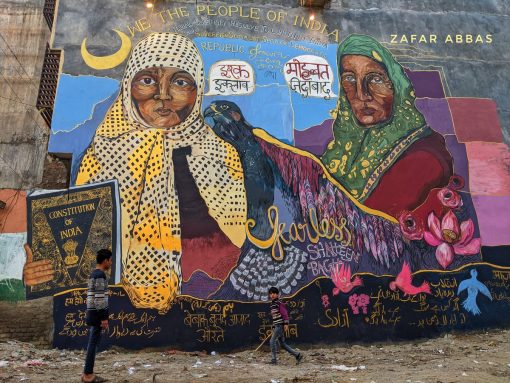“CAA tells us that we can’t be Indian because we are Muslims. Why won’t we protest? It’s our ethical obligation (akhlaqi farmaan), our religious imperative (farz) to fight for our citizenship. Afterall, we are Muslims.”
– Naaz, anti-CAA protester, Lucknow, February 2020.
On December 12, 2019, the Indian government under the right-wing, Hindu nationalist, Bhartiya Janta Party (BJP) passed the Citizenship Amendment Act (CAA), which extended citizenship to all non-Muslim minorities from neighboring Islamic countries—Afghanistan, Bangladesh, and Pakistan—who had arrived in India before December 24, 2014, on grounds of religious persecution. There was however no agreed-upon criteria for religious persecution; fears of persecution reported by non-Muslim immigrants were accepted as valid considerations for asylum as well. CAA evinces the government’s Hindu nationalist stance on positing Islam (and Islamic nations) as essentially intolerant of non-Muslims.[1] Uninterested in (and worse, apathetic to) the state persecution of Muslim minorities in Islamic countries, the Act only opens its proverbial door of refuge for non-Muslim migrants. Assaulted, discriminated and marginalized by the governments in Pakistan and Afghanistan on matters of Islamic beliefs and practices, Shia, Ahmadiyya and Hazara communities find themselves at the edges of social life but do not qualify for refuge under the CAA.
The Act was criticized for making religion an overt criterion for citizenship, a first in Independent India. Besides being discriminatory toward persecuted Muslim immigrants from these countries, CAA effectively threatened the citizenship of Muslims in India, 1.7 million of whom were already excluded from the national registry of citizenship (NRC), a countrywide documentation of Indian citizens, despite possessing the required paperwork.[2] Declared foreigners and rendered stateless, these Indian Muslims—unlike their fellow Hindu citizens who were also left out of the NRC—would not be able to seek Indian citizenship under the new citizenship amendment and await their fate at detention centers.[3] Coupled with NRC, CAA was read as an attack on Muslim citizenship in India, a legal confirmation of the current Hindu nationalist discourse— “Muslims are not Indians.”
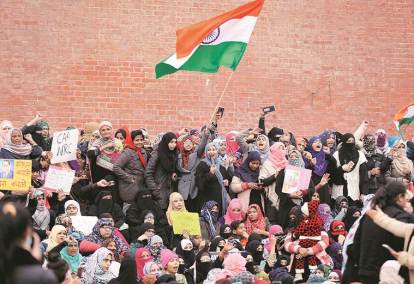
When Muslim women from Old Lucknow came together to protest the CAA at the historic clocktower (Ghantaghar), their most vocal representative was the 23-year-old burqa-clad Naaz. Undeterred by the ominous vigilance of police officers circling Ghantaghar, Naaz led anti-government protest slogans and encouraged Muslim women to stay steadfast in their fight for Haqq (Truth) and frequently evoked the Shahada (La ilaha illa Allah—the Muslim profession of faith) as a sustaining force for the CAA resistance. Yet in the public sphere, anti-CAA discourse was articulated primarily within secular frames.
This essay seeks to interrupt the reading of CAA protests as a revival of India’s lost spirit of secularism in order to present a narrative of feminist Islamic ethics that animates the CAA resistance. Based on my ethnographic work with Muslim women in Old Lucknow during the CAA protests (Jan-March 2020), I share an alternative reading of the anti-CAA resistance, highlighting the ethical persuasions that inform Muslim political resistance. Moving away from the impetus that recognizes any democratic possibilities primarily (and exclusively) through the framework of Indian secularism, this article puts forth a counter-narrative of CAA resistance as Islamic ethical striving, demonstrating how people deploy religious discourses to restore ruptures in democracy.
Anti-CAA: A Secular Protest?

Unlike its Western counterparts, secularism in India is not a separation of Church and State. It is rather the recognition by the State of all religions, the equal treatment for all religious communities, and the active promotion of religious harmony.[4] While it has long been consistently questioned, debated, and critiqued, secularism under the current political regime of the BJP (Bharatiya Janata Party) has now been upended to claim India as a Hindu nation.[5] CAA was a constitutional step in that direction.[6] It was no surprise when the critics of the government described the anti-CAA protests led by Muslim women as a secular nationalist resistance aimed to rekindle the religious tolerance of Indian secularism that had shrunk in the wake of Hindu nationalism.
The Muslim women’s protest started in Shaheen Bagh, a Muslim-majority area in southeast Delhi, after the brutal police crackdown on students protesting the CAA on campuses in Delhi and UP.[7] Voicing their support for the violated students, Muslim women, largely from working-class backgrounds, sat on the interstate highway, disrupted traffic, and demanded a rollback of the CAA. By initiating the largest civilian resistance in Independent India, these women-inspired sit-ins [called Shaheen Baghs] across the country where they occupied public spaces, chanted anti-CAA slogans and refused to accept their status as secondary citizens.[8]

The government deemed the Muslim women protesters to be a part of an Islamic conspiracy funded by Muslim countries globally and dismissed them as anti-nationals.[9] But these women found support among activists, scholars, and journalists who hailed them as secular symbols of women’s political resistance to the hyper-masculine Hindu state.[10] Protesting Muslim women described as “unlikely revolutionaries” were valorized for demanding their “political rights” as Indians. In choosing nationalism over Islam and the constitution over Sharia, these women lead the patriotic struggle for India’s secular future. [11] But this all-encompassing narrative of secular resistance did not recognize the ethical strivings that informed Muslim resistance and the dynamic ways in which Muslim women drew upon the repository of Islam to articulate their modes of protest. I share one such recognition in speaking with Naaz, the young protester from Lucknow, for whom CAA was not a choice between religion and nation, but her farz as a Muslim.
Anti-CAA Protest as Farz: A Muslim Ethical Imperative
Exasperated at the contested binary between India and Islam in the anti-CAA discourse, Naaz was baffled by the choice of nation (mulk) over religion (mazhab). She expressed her agitated confusion in one of our conversations. [12]
“But Zehra Appi, Islam is not a choice for us! It’s our faith (iman), it makes us who we are. We become Muslim by saying the Shahada, La Ilaha Ill Allah, Mohammud ur Rasool Allah. It means, ‘there is no God but Allah, and Mohammad is His Prophet.’ The first word of our testimony of faith is La, which means No! We refuse the existence of any other God but Allah. Now you tell me, how can people who come into existence by refusing, not protest? And what is resistance (ehtijaj) but a form of refusal (inkar)? This resistance and refusal are our lineage (virasat) as Muslims. Won’t we protest the CAA? We are Muslims! It’s our ethical obligation (akhlaqi farmaan), our, religious imperative (farz)!” [Naaz shakes her head in bemused bewilderment, readjusts her hijab gently, and resumes talking. Her reflective tone is now purposive] “When we say CAA is a fight for our haqq, we mean it’s the fight to be believers in Allah (mu’min).[13] It’s our protest to be Muslims as Indians, not Muslims or Indians. Then to say that we are protesting as Indians and not Muslims is absurd. Isn’t our fight for the constitutional right about the freedom to practice our religion without any discrimination? Then how can the Islam be taken out of our demands, let alone our protest? It’s what makes us Muslims. Isn’t that what we are fighting for? To be Muslim in India?”
The secularizing zeal attributed to the anti-CAA protest baffles Naaz not only because it splits ethics and politics, but more acutely because it fails to consider the inextricable ways in which faith is a foundation for Muslim subjectivity.[14] By articulating her resistance in the grammar of faith, Naaz blurs the secular binary of ethics and politics. She traces her theological inheritance of refusal in the Shahada and the theological basis of her political demands of citizenship in Haqq. Formulating an Islamic obligation (akhlaqi farman) as a religious imperative (farz) to resist, Naaz curates a framework of Islamic ethics for an otherwise secular protest in which faith (iman) guides her fight to be Indian. In so doing, she simultaneously rearranges the boundaries of the personal and the political where Shahada, Haqq, Akhlaqi Farman, Farz and Iman, are pious persuasions as well as ethical imperatives for protesting a tyrannical government.
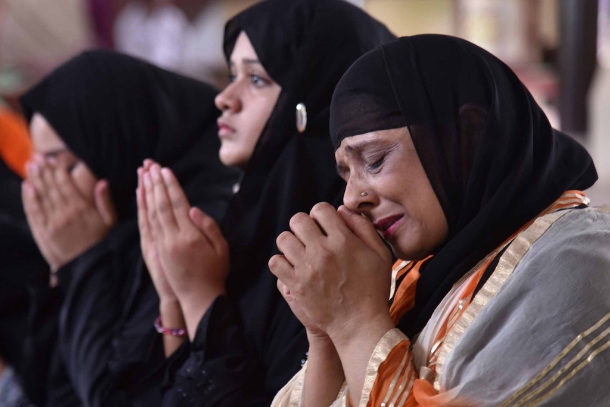
Source
In crafting the ethics of her political actions in Islamic theology, Naaz partakes in the rich discourse of Islamic tradition in which Muslim women have consistently produced, reproduced, discussed and debated questions of subjectivity, identity, agency, and community. Scholars have long explored feminist issues by studying the feminist movements in the Middle East (Ahmed 1982), undertaking a historical and theological inquiry of women in Islam (Mernissi 1991), un-reading the patriarchal perspectives in the Qur’an (Barlas 2002), conceptualizing feminist subjectivity through Islamic ethics (Mahmood 2005), attending to the gendered embodiments of Islamic theology (Deeb 2009), examining the self-making of the pious female religious subject under secular law (Fernando 2010) and exploring the convergences between secular and religious feminism in Islam (Badran 2013). For her part, undoing the boundaries of ethics and politics, Naaz not only re-conceptualizes feminist Muslim subjectivity but also shares an Islamic ethic of resistance that informs political action.
Naaz isn’t alone in manifesting her ethical formation. The anti-CAA protest at Ghantaghar is replete with Islamic ethics. Rolling their fingers over the beads of their rosary (tasbi), Muslim women sing songs of martyrdom, read verses of the Qur’an over posters of freedom fighters to bless their souls (ruh) and narrate stories from the hadith to children about living on the path of Truth (Sirat-Al Mustaqeem) amidst adversity. Besides dutifully offering namaz at the protest site, older women lead the jumma’h on Fridays and sermonize on the responsibility (zimmedari) to resist oppression as Muslims. The Friday fasts (roza) are an offering made to Allah for the acceptance of their protest. Women read their present predicament not as a punishment from Allah (azab) but as a test of their faith (iman ka imtehan) and link their tribulations to the trajectories of Islamic prophets, namely, Ibrahim (Abraham), Nuh (Noah), Musa (Moses) and Ayub (Job)—all of whom offered their testament of faith under insurmountable duress. Articulating CAA as their Karbala, protesting women readily evoke the Shia theological archive of resistance and identify with Zainab, the sister who survived a battle to tell the world about the martyrdom of her brother Hussain. As witnesses to the injustice and violence of their times, they are all Zainab. Assaulted by the police, women invoke Allah as their sole benefactor (wahid karna wala) and call themselves people of faith (iman wale). They assert that they are true Muslims (sacche Musalmaan), brave daughters of the Muslim community (Qaum ki bahadur betiyan), and believers (mu’min)who are willing to embrace any and all consequences that come with being Muslim in contemporary times. Naaz’s ethics of resistance is less an individual reading of politics than a shared frame of significance deeply embedded in the collective landscape of Islamic ethics which intimately informed the anti-CAA protest.
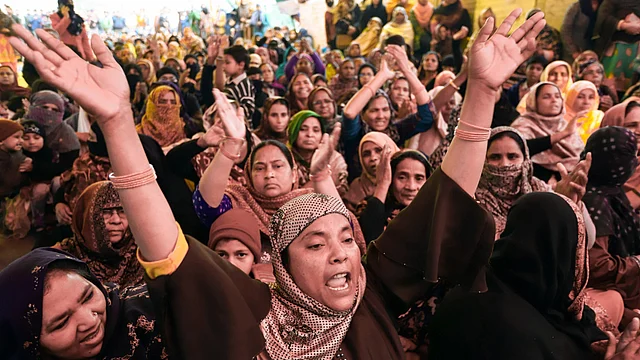
While the anti-CAA discourse centered on the indispensable role of Muslim women in the political sphere, it consistently failed to consider piety as an animating possibility, a critical impetus of resistance. Even when feminist scholars tried to recognize the refusal of Muslim women to “trade off their Muslimness to legitimize their political aims,” they remained unable to engage with the discursive realm of religion in the lives of protesting women and reiterated the linear political rhetoric of Muslim women resistance rooted in the liberatory zeal of secular feminism.[15] Locating her ethical comportment of being Muslim in her political fight for being Indian, Naaz gives us a feminist Muslim subjectivity that not only challenges the secularization of the anti-CAA protest but also beckons a serious engagement with the political role of piety in the lives of Muslims in India, of Muslim women in particular.[16]
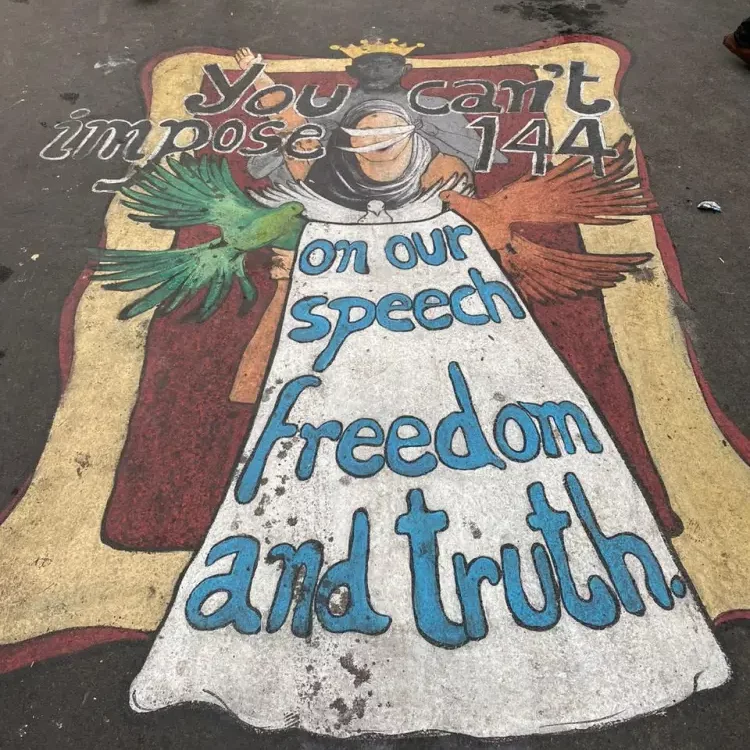
Conclusion
In the devastating wake of Hindu nationalism, the anti-CAA protest by Muslim women was a pivotal moment of civil disobedience in Independent India. In their refusal to quietly accept their de-naturalization as citizens, Muslim women demonstrated ways in which their anti-CAA resistance carries a democratic vision of the country where all its citizens are equal, or more aptly, equally Indian. However, this resistance is less driven by proclamations of nationalist secular feminism than it is derived from a framework of Islamic ethics that attends to the fractures of democracy. This essay has tried briefly to outline this framework of ethics and shared a narrative of the ethical striving of a political protest.

In articulating her resistance as an ethical obligation, Naaz produced a discursive reading of Islamic ethics that informed her modes of anti-CAA protest. In curating farz as ethics of political resistance, she drew upon the Islamic tradition to not only express herself as a pious Muslim but, more directly, to render her political actions as ethically meaningful. Her protest demonstrates the dynamic ways in which faith, instead of being antithetical to democratic practices and civic engagements, lends them a crucial ethical impetus and sustains commitment. Naaz’s farz also confronts the Indian secular feminism that consistently foregrounds Islam as anti-democratic and particularly oppressive to women. It allows for feminist imaginaries that engage with the politics of Muslim women’s piety.
The counternarrative of a twenty-three-year-old spritely anti-CAA protester from Lucknow thus troubles the secular binary of ethics and politics and illustrates that demonstrations aiming to preserve India’s secular spirit were rather embodied in the Islamic ethical comportment by Muslim women. Who knew Islamic ethics could undergird a secular protest for democracy? Who knew Muslims could draw upon Islamic frameworks to be Indians? Who knew Muslim women could craft a political theology of resistance in farz? Certainly, the Hindu nationalists didn’t. Unfortunately, the secularists didn’t either. Clearly, Naaz did.
Acknowledgments
I thank Dheepa Sundaram, Rachel McDermott, Gil Anidjar, Safwan Amir, Shweta Radhakrishnan, Swarnim Khare and Rudra Guha Biswas for their critical engagement with drafts of this essay.
Footnotes
[1] See Amalendu Misra, “Sarvarkar’s Discourse on Radical Ethno-Nationalism,” in Identity and Religion: Foundations of Anti-Islamism in India (New Delhi: Sage Publications Pvt. Lmt., 2004), 146-188.
[2] Lauren Frayer and Furkan Latif Khan, “Millions in India Face Uncertain Future after Being Left Off Citizenship List.” National Public Radio, May 20, 2019. https://www.npr.org/2019/05/10/721188838/millions-in-india-face-uncertain-future-after-being-left-off-citizenship-list
[3] For the impending reality of detention centers see Sigal Samuel, “India’s massive new, scary detention camps, explained.” VEX, September 19, 2019. https://www.vox.com/future-perfect/2019/9/17/20861427/india-assam-citizenship-muslim-detention-camps. With approx. 1.7 million citizens were left out of its final draft, NRC was a bureaucratic fiasco. Besides Muslims, Bengali Hindus, Assamese Hindus, Gorkhas, and other indigenous tribes also did not find themselves in the final version of the NRC. The chief of Rashtraiya Swayamsevak Sangh (RSS), the right-wing Hindu nationalist paramilitary organization, Mohan Bhagwat assured the Hindus left out of NRC against expulsion from the nation (Hindustan Times Correspondent, “ ‘No Hindu will be expelled, even if his name is missing from the NRC’: RSS chief.” Hindustan Times, September 24, 2019. https://www.hindustantimes.com/india-news/no-hindu-will-be-expelled-even-if-name-is-missing-from-nrc-says-rss-chief/story-HBYmWBPvLmkZjgdRMkNhrO.html.
[4] For the trajectory of secularism in India from its constitutional history to its social-political manifestations, see T.N Madan, “Secularism and its Place.” The Journal of Asian Studies. Vol 46: 4 (1987): 747-759
[5] Critical discourse on secularism has committedly examined the socio-political nature of the Indian state, its undulating implication for India’s religious minorities and the rise of Hindu majoritarianism. See Rajeev Bhargava, Secularism and its Critics (Delhi: Oxford University Press, 1999) and Anuradha Dingwaney Needham and Rajeshwari Sundar Rajan, The Crisis of Secularism in India (North Carolina, Duke University Press, 2007).
[6] For a commentary on CAA and Indian secularism see, Narender Nagarwal, “The Citizenship Amendment Act 2019: An Insight through Constitutional and Secularism Perspective.” Journal of Asian and African Studies. 57, 8 (2002): 1562-1578.
[7] Hannah Ellis-Petersen, “India Clamps Down Citizenship Law Protests.” The Guardian, December 18, 2019. https://www.theguardian.com/world/2019/dec/18/india-clamps-down-against-citizenship-law-protests.
[8] Debobrat Ghose, “Anti-CAA Protests at Shaheen Bagh, Powered by Women, Has Become a Symbol of Resistance and Spawned Replicas across Country.” Firstpost, January 20, 2020. https://www.firstpost.com/india/anti-caa-protest-at-shaheen-bagh-powered-by-women-has-become-symbol-of-resistance-and-spawned-replicas-across-country-7933071.html
[9] Staff reporter, “Shaheen Bagh dharma as a global conspiracy by Muslim countries against India: BJP MLA” The Hindu, 28 November, 2021. https://www.thehindu.com/news/national/shaheen-bagh-dharna-a-global-conspiracy-by-muslim-countries-against-india-bjp-mla/article61628160.ece
[10] For scholarly commentaries on Muslim women, secularism, and nationalism at the CAA protests, see Syeda Hameed, “Brave Women of Shaheen Bagh.” Wire, December 23, 2019. https://thewire.in/women/caa-nrc-protests-shaheen-bagh; Kiran Vinod Bhatia and Radhika Gajjala, “Examining Anti-CAA Protest at Shaheen Bagh: Muslim Women and the Politics of Hindu India.” International Journal of Communication, 14 (2020): 6286–6303, and Kriti Goyal, “Struggle against Fascism: Some Reflections on Muslim Women Anti-CAA Protests.” Feminism India, November 13, 2020. https://feminisminindia.com/2020/11/13/fascism-caa-nrc-muslim-women-protests/
[11] In the introduction of her edited book, Shaheen Bagh and the Idea of India: Writing on a Movement for Justice, Liberty and Equality (2020), Seema Mustafa calls the Muslim women protesters “unlikely revolutionaries” because no one expected Muslim women to be the flag bearers of a political resistance against the state. Dissolving differences of religion and caste, Shaheen Baghs across the country demonstrated India’s secular unity. All the 18 essays in the volume reiterate not only the secularism of the protest but its ties with questions of justice, liberalism and citizenship.
[12] I share a truncated version of my several conversations with Naaz.
[13] Al Haqq is one of the 99 names of Allah. It means Truth and Reality in Arabic.
[14] The binary of ethics and politics is a consequence of secular modernity. See Talal Asad, Formation of the Secular: Christianity, Islam, Modernity (Stanford: Stanford University Press, 2003).
[15] For this struggle of engaging with the discursive sphere of religion in the lives of protesting Muslim women see anti-Yash Sharma and Satakshi Singh, “Shaheen Bagh and the Politics of Protest in the Anti-CAA Movement in India.” Feminist Encounters: A Journal of Critical Studies in Culture and Politics, 7, 1 (2023), 10.
[16] While Indian feminism has been reticent to acknowledge the significance of religion in the lives of Muslim women, a few scholars have attempted to address feminist concerns of identity and agency without disavowing religion. See Nida Kirmani, “Claiming their space: Muslim women-led networks and the women’s movement in India.” Journal of International Women’s Studies, 11, 1 (2009), 72-85 and Kalyani Devki Menon. “Religion, Power and Place: Three Muslim Women’s Stories in Old Delhi. SAMAJ, 32 (2024): 1-17. https://journals.openedition.org/samaj/9573.
Works Cited
Ahmed, Leila. 1982. “Feminism and Feminist Movements in the Middle East, a preliminary exploration: Turkey, Egypt, Algeria, People’s Democratic Republic of Yemen.” Women Studies International Forum. 5 (2): 153-168.
Asad, Talal. 2003. Formations of the Secular: Christianity, Islam, Modernity. Stanford University Press.
Badran. Margret. 2013. Feminism in Islam: Secular and Religious Convergence. London: Oneworld Publications.
Barlas, Asma. 2002. Believing Women in Islam. Unreading Patriarchal Interpretations of the Qur’an. Texas: University of Texas Press.
Bhatia, Kiran Vinod, and Radhika Gajjala. 2020. “Examining Anti-CAA Protests at Shaheen Bagh: Muslim Women and Politics of the Hindu India.” International Journal of Communication 14: 6286-6303.
Deeb. Lara. 2009. “Emulating and or/ embodying the ideal: The gendering of temporal frameworks and Islamic role models Shi’i Lebanon.” American Ethnologist. 36 (2): 242-257.
Fernando, Mayanthi. L. 2010. “Reconfiguring freedom: Muslim piety and the limits of secular law and public discourse in France.” American Ethnologist. 37 (1): 19-35.
Frayer, Lauren, and Furkan Latif Khan. “Millions in India Face Uncertain Future after Being Left off Citizenship List.” NPR. Org, May 10, 2019. https://www.npr.org/2019/05/10/721188838/millions-in-india-face-uncertain-future-after-being-left-off-citizenship-list
Goyal, Kriti. “‘Struggle against Fascism: Some Reflections on Muslim Women Anti-CAA Protests.’” Feminism India. November 13, 2020. https://feminisminindia.com/2020/11/13/fascism-caa-nrc-muslim-women-protests/
Hameed, Syeda. “The Brave Women of Shaheen Bagh.” The Wire, December 23, 2019. https://thewire.in/women/caa-nrc-protests-shaheen-bagh;
Hindustan Times Correspondent, “‘No Hindu will be expelled, even if his name is missing from the NRC’: RSS chief.” Hindustan Times, September 24, 2019. https://www.hindustantimes.com/india-news/no-hindu-will-be-expelled-even-if-name-is-missing-from-nrc-says-rss-chief/story-HBYmWBPvLmkZjgdRMkNhrO.html
Kirmani, Nida. 2009. “Claiming Their Space: Muslim Women-Led Networks and the Women’s Movement in India.” Journal of International Women’s Studies 11 (1): 72–85.
Madan, Triloki. Nath. 1987. “Secularism and Its Place.” The Journal of Asian Studies 46 (4): 747–59.
Mahmood, Saba. 2005. Politics of Piety: The Islamic Revival and the Feminist Subject. Princeton: Princeton University Press.
Menon, Kalyani, Devki. 2024. “Religion, Power and Place: Three Muslim Women’s Stories in Old Delhi. SAMAJ, 32 (2024). https://journals.openedition.org/samaj/9573
Mernissi, Fatima. 1991. Women and Islam: a historical and theological inquiry. London: Oxford Basil Blackwell.
Misra, Amalendu. 2004. Identity and Religion: Foundations of Anti-Islamism in India, New Delhi: Sage Publications Pvt. Lmt.
Mustafa, Seema. 2020. Shaheen Bagh and the Idea of India: Writings on a Movement for Justice, Liberty and Equality. Speaking Tiger Books LLP New Delhi.
Samuel, Sigal. 2019. “India’s Massive New, Scary Detention Campus, Explained.” VOX, September 19, 2019. https://www.vox.com/future-perfect/2019/9/17/20861427/india-assam-citizenship-muslim-detention-camps
Sharma, Yash, and Shatakshi Singh. 2023. “Shaheen Bagh and the Politics of Protest in the Anti-CAA Movement in India.” Feminist Encounters: A Journal of Critical Studies in Culture and Politics 7 (1): 01–14.
Staff Reporter. n.d. “Shaheen Bagh Dharma as a Global Conspiracy by Muslim Countries against India: BJP MLA.” The Hindu. https://www.thehindu.com/news/national/shaheen-bagh-dharna-a-global-conspiracy-by-muslim-countries-against-india-bjp-mla/article61628160.ece

